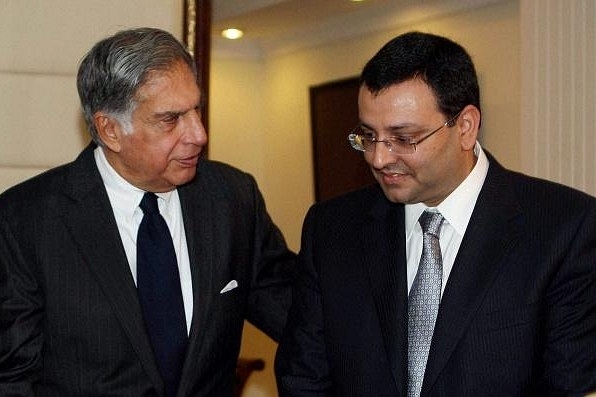Business
NCLT’s Verdict In Tata Sons Case Does Less Than Justice To Cyrus Mistry
- The only long-term solution to the Tata-Mistry fight is an out-of-court one, where the latter exits at a fair price, and the Tatas get to run Tata Sons as a private group holding company.

Ratan Tata and Cyrus Mistry. (PTI)
The National Company Law Tribunal’s (NCLT’s) rejection of Cyrus Mistry’s petition against his dismissal from the executive chairmanship of Tata Sons in 2016 and for proportionate representation on the board appears to be a trifle unfair, especially on the latter’s plea to protect its minority interests.
Family firms owned or controlled by the Mistrys own over 18.4 per cent in Tata Sons, and to that extent their interests cannot be sidelined by the majority owners, mainly the Tata Trusts.
A two-judge bench of the NCLT found no merit in Mistry’s claim that Ratan Tata and N Soonawala were super directors, who interfered with the functioning of Tata Sons, and held that the board did have the right to dismiss him from the chairmanship. The NCLT also rejected Mistry’s demand for board seats proportionate to their shareholding, and declined to stop Tata Sons from converting itself into a private company.
While one can accept the reality that the Tata Sons board had the competence to dismiss its chairman, what seems unfair is the tribunal’s decision to effectively emasculate a significant minority shareholder from having board representation or even any say in the company’s future.
Under a proposal to take Tata Sons private last year, the articles of association were to be amended to enable preference shareholders to get a vote in case the company skips dividends for any two years consecutively. As we noted in Swarajya at that time, “taking the holding company private means the board can take decisions without shareholder approvals, (and) the move to give preference shareholders voting rights in case dividend is skipped for two years will allow large holders of these shares – including Ratan Tata, the man behind Mistry’s ouster – a larger direct stake in Tata Sons.”
According to The Economic Times, Ratan Tata is the biggest holder of preference shares – about 10.5 lakh of them.
One of the major policy decisions taken by the Tatas is to consolidate holdings in major group companies by buying out the cross-holdings held by operating companies in each other, and this calls for Tata Sons to buy them out. It is thus possible – though not probable – that Tata Sons may skip dividends at some point when cash flows constrict. At that stage, the Mistrys would find themselves squeezed.
This manoeuvre by Tata Sons makes strategic sense, since it would then force the Mistrys to sell out at a price lower than what market realities would warrant.
Tata Sons owns 72 per cent in Tata Consultancy Services (TCS), which is currently valued at Rs 7.23 lakh crore. An 18.4 per cent share of the valuation of just this one company – leave alone the rest of Tata Sons shareholdings – would be worth just over $19 billion at current exchange rates. Take the rest of the holdings of Tata Sons, and the Mistry share would work out to well in excess of $20 billion.
It is a pity that the Mistrys are being sought to be squeezed out of their share of the group holdings and the NCLT has done nothing to remedy this situation.
The Mistrys clearly have reason to fight on, given the stakes involved. In a statement issued after the NCLT ruling, the Mistrys vowed to continue the battle. The statement said, inter alia: “The ruling of the National Company Law Tribunal is disappointing although not surprising. We will continue to strive for ensuring good governance and protection of the interests of minority shareholders and all stakeholders in Tata Sons from the wilful brute rule of the majority.”
The only long-term solution to the Tata-Mistry fight is an out-of-court one where the latter exits at a fair price, and the Tatas get to run Tata Sons as a private group holding company. Clearly, the Tatas did not handle the exit of Cyrus Mistry well in 2016; they should have negotiated his exit quietly with no loss of face. Making him a permanent enemy was a mistake. Mistry is fighting more for his pride than for his money.
Introducing ElectionsHQ + 50 Ground Reports Project
The 2024 elections might seem easy to guess, but there are some important questions that shouldn't be missed.
Do freebies still sway voters? Do people prioritise infrastructure when voting? How will Punjab vote?
The answers to these questions provide great insights into where we, as a country, are headed in the years to come.
Swarajya is starting a project with an aim to do 50 solid ground stories and a smart commentary service on WhatsApp, a one-of-a-kind. We'd love your support during this election season.
Click below to contribute.
Latest